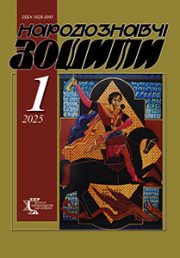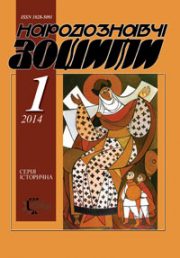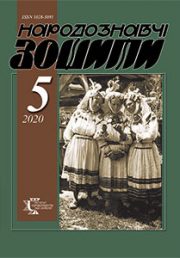The Ethnology Notebooks. 2018, 3 (141), 608–617
UDK 394.24(=161.32’282.2Лем):398.8
DOI https://doi.org/10.15407/nz2018.03.608
LEMKO «VECHIRKY» («VECHYRKY», «VECHURKY», «PRIADKY»)
Horbal Mariia Yulianivna, leading scientific editor
of the Institute of Ethnology of the National Academy of Sciences of Ukraine.
Svobody Avenue 15, 79000, Lviv, Ukraine.
Contacts: Tel. (067)7117846; e-mail: horbal.m@gmail.com
Abstrakt. The article describes Lemko’s «vechirky» as a form of youth group work — spinning linen, wool and cannabis. It emphasizes the economical and social function of this work, highlighting the important role of «vechirky» in preserving Ukrainian folklore and passing it to the future generations. Some proverbs, legends, myths, songs and games that were used in «vechirky» activities are presented in the article. An artistic reconstruction of Lemko «vechirky» can be staged based on the materials of the article.
Keywords: «vechirky», spinning, group work, village community
Received 16.05.2018
References
Bajko, M. (ed.). (2005). Antolohiia lemkivs’koi pisni. L’viv: Afisha [in Ukrainian].
Bodak, Ya. (2011). Spomyny nashykh didiv-bat’kiv. Nashe slovo, 39. Varshava [in Ukrainian].
Hojsak, V. (2014). Lemkivsky vechirky v Pankni. Nashe slovo, 3. [in Ukrainian].
Hojsak, V. (2013). Tradytsyjny lemkivsky vechirky. Medvid chy Solom’ianyk? Vatra, 1 (80). 6—7, 27 [in Ukrainian].
Horbal’, M. (2004). Pylypivka, «lamanyk», «lamanchyk». Lemkivs’kyj kalendar na 2005 rik. L’viv: Instytut narodoznavstva NAN Ukrainy [in Ukrainian].
Horbal’, M. (2011). Rizdviana obriadovist’ Lemkivschyny. L’viv: Instytut narodoznavstva NAN Ukrainy [in Ukrainian].
Horbal’, M. (2004). Khreschennia kavaliera. Lemkivs’kyj kalendar na 2005 rik. L’viv: Instytut narodoznavstva NAN Ukrainy [in Ukrainian].
Huzij, R., Varkhol, J., Varkhol, N. (2002). Pokhoronni obriady, In Lemkivschyna. Istoryko-etnohrafichne doslidzhennia. (Vol. 2, pp. 94—109). L’viv : Instytut narodoznavstva NAN Ukrainy. [in Ukrainian].
Kolessa, F. (2009). Ohliad ukrains’ko-rus’koi narodnoi poezii. Visnyk L’vivs’koho universytetu. Seriia filol. Issue 47, 67—172 [in Ukrainian].
Lemkivs’kyj kalendar na 2004 rik. (2003). L’viv: Kameniar [in Ukrainian].
Madzelian, S. (1996). Zyma v Karpatakh. Vatra, 4. Varshava [in Ukrainian].
Mushynka, M. (1988). Dukhova kul’tura. Baliady. Lemkivschyna: zemlia — liudy — istoriia — kul’tura. (Vol. 2). N’iu-Jork; Paryzh; Sydnej; Toronto [in Ukrainian].
Kharchyshyn, O. (ed.). (2005). Narodna pisennist’ pidl’vivs’koi Zvenyhorodschyny. L’viv: Instytut narodoznavstva NAN Ukrainy [in Ukrainian].
Padovs’ka, O. (2014). Knyzhka pro Malkovychi. L’viv: LihaPres [in Ukrainian].
Perejma, T. (1912). Pokhoronni zvychai j obriady v seli Ropytsy Rus’kij, Horlyts’koho povita. In Hnatiuk V. Pokhoronni vychai j obriady: Etnohrafichnyj zbirnyk. (Vol. ХХХІІ, pp 203—209). L’viv [in Ukrainian].
Perih, R. (2013). Nemerknuchi perlyny: Lemkivs’ki prypovidky. L’viv [in Ukrainian].
Pos’mijme sia kusts’ok. (2003). Lemkivs’kyj kalendar na 2004 rik. L’viv: Kameniar [in Ukrainian].
Rydzanych, A. (2008). Stary slova v teksti. Vechirky. Richnyk Ruskoj Bursy. Horlytsi: Stovaryshynia «Ruska Bursa» [in Ukrainian].
Syvyts’kyj, M. (1988). Dukhova kul’tura. Lemkivschyna: zemlia — liudy — istoriia — kul’tura. (Vol. 2). N’iu-Jork; Paryzh; Sydnej; Toronto [in Ukrainian].
Khomyk, V. (2003). Nasha Lemkivschyna: poezii ta pisni. L’viv: Kameniar [in Ukrainian].
Shmajda, M. (2015). Balady. Miunkhen: Ukrains’kyj Vil’nyj Universytet [in Ukrainian].
Yavors’kyj, O. (1912). Pokhoronni zvychai j obriady v Yasel’s’kim poviti, In. Hnatiuk V. Pokhoronni zvychai j obriady: Etnohrafichnyj zbirnyk. (Vol. ХХХІІ, pp. 209—210). L’viv [in Ukrainian].






